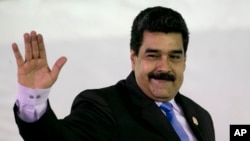Venezuela’s electoral officials have suspended a referendum effort that could have led to the ouster of President Nicolas Maduro. The Thursday action followed nearly a year of opposition campaigning for the referendum.
Officials alleged fraud had taken place in the signature-gathering process that was part of an attempt to stop the opposition effort to remove the socialist leader at the ballot box.
"Of course, they have the right to request for the referendum, but they are also forced to comply with the constitution and the law. And we have the right to defend brother Nicolas Maduro, because I voted for Maduro, and I want Maduro to finish his term,” said Diosdado Cabello, a lawmaker with the United Socialist Party of Venezuela (PSUV).
The official announcement came as a shock to referendum supporters who called the decision unconstitutional. The order also came hours after Maduro left Venezuela on a multi-nation tour of the Middle East.
Former Venezuelan presidential candidate Henrique Capriles said he and seven opposition leaders have received a court order blocking them from leaving the country.
Capriles posted the document on Twitter and wrote “Once again they are wasting their time.”
Public opinion polls indicate a majority of Venezuelans want Maduro out of office.
The electoral council said the decision to stop the referendum was based on Thursday’s court ruling that found fraud in the initial steps of the petition drive.
Recalling Maduro would push the Socialist Party out of power and trigger an early presidential election.
The recall effort had run into opposition from the election board, which imposed restrictions early on and argued that it would take until 2017 to put the proper conditions in place.
The Democratic Unity coalition urged daily protests against "anti-constitutional" conditions by the board.
But Thursday's ruling was followed by another decision after the electoral council suspended for 6 months gubernatorial elections that were scheduled for later this year.
The socialist party decided to put off elections indefinitely.
"The recall referendum has to be in 2016, the country's conditions demand it," opposition supporter Joaquin Mendoza, a 68-year-old publicist, said earlier.
"Otherwise there will be more dead in the street, more hunger," he added, citing Venezuela's high murder rate.
Venezuelan officials blame the opposition for the timing, saying the coalition took three months to reach a consensus on the referendum and that fraud was committed in a preliminary signature drive.





